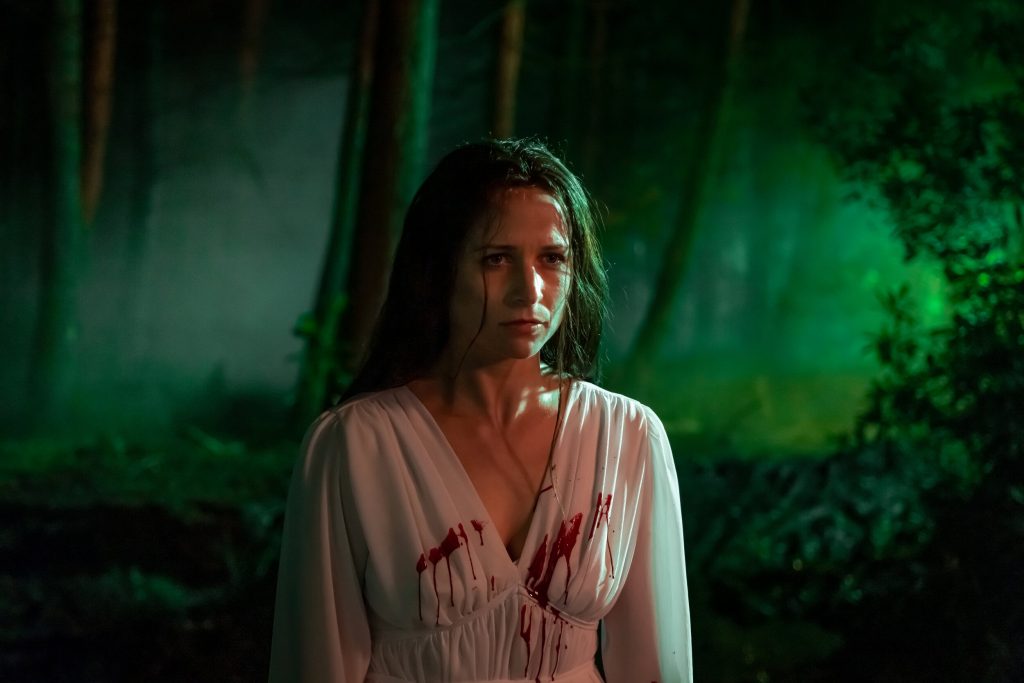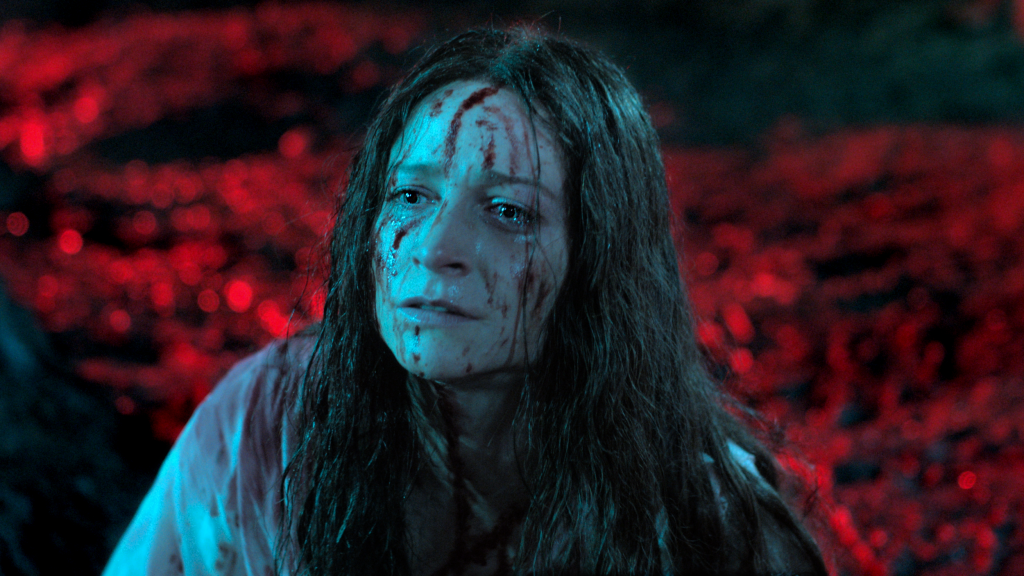June 26, 2021
by Carla Hay

Directed by Prano Bailey-Bond
Culture Representation: Taking place in early 1980s England, the horror film “Censor” features a predominantly white cast (with a few black people) representing the middle-class.
Culture Clash: A woman who works as a movie censor begins experiencing nightmarish visions related to a tragedy from her past.
Culture Audience: “Censor” will appeal primarily to people who are interested in horror films that put more emphasis on creating unsettling atmospheres than providing easy answers.

“Censor” is the type of horror movie that won’t satisfy people who are looking for a predictable ending, but it succeeds in immersing viewers into the psychological terror of a very disturbed mind. The movie has plenty of gory and bloody murder scenes, but what many viewers might find more frightening is being taken into a world where fact and fantasy are constantly blurred and play tricks on people’s sense of reality. Niamh Algar’s riveting performance in “Censor” elevates the movie’s tendency to be repetitive, which could have dragged down the story if not for Algar’s commendable acting.
Directed by Prano Bailey-Bond, “Censor” is her feature-film directorial debut, based on Bailey-Bond’s short film “Nasty.” Bailey-Bond and Anthony Fletcher co-wrote the screenplay for “Censor,” which takes place in early 1980s England, when the VHS video boom caused an increase in direct-to-video releases that could bypass the censors. Horror movies in particular benefited from the direct-to-video business model. And in England, these uncensored films became known as “video nasties.”
“Censor” takes place during a time when the British Board of Film Censors (which changed its name to the British Board of Film Classification in 1984) was adapting to the increasing distribution of videotapes sold directly to consumers as a new format for the movie industry. The BBFC, which is a non-governmental group founded by the film industry, works in a way that’s similar to the Motion Picture Association of America, by classifying or rating films, based on the minimum age that would be deemed appropriate to see those films.
In “Censor,” Algar portrays Enid Baines, a prim and proper spinster in her 30s who works for the BBFC. She takes her job very seriously and is a stickler for details. In an opening scene of the “Censor,” she has a conversation with her condescending co-worker Sanderson (played by Nicholas Burns) about a scene they watched in a horror movie that’s being evaluated for a rating classification.
Enid says to Sanderson, “The decapitation is ridiculous. It’s the eye gouging. It’s too realistic. Plus, I was trying to see who dragged her away.” Sanderson replies, “Does it matter? … I appreciate you analyzing this with clear precision, Enid. But someone perhaps got out of the cautious side of the bed this morning.”
Enid ignores Sanderson’s attempt to belittle her as uptight. Fortunately, not all of her co-workers are disrespectful. Enid also works closely with matronly Anne (played by Clare Perkins) and easygoing Perkins (played by Danny Lee Wynter), who both express concerns to Enid about her emotional well-being if it looks like she’s particularly disturbed by any of the violent content that she has to screen for her job. Enid experiences sexual harassment from a movie producer named Doug Smart (played by Michael Smiley) when he makes rude and sexist comments to her while he visiting in the office.
“Censor” doesn’t really show much of Enid’s home life, because viewers will get the impression that her life revolves around her work. However, there’s a tragedy from Enid’s past that has been haunting her. And a decision that her parents have made about this tragedy seems to set Enid off on a downward spiral of madness.
One day, Enid’s parents June Baines (played by Clare Holman) and George Baines (played by Andrew Havill) invite her to dinner at a restaurant to tell her some important news: They have decided to officially declare their missing daughter Lucy as dead. Lucy, who was Enid’s younger sister, disappeared in the forest of Chorleywood (a village in England), in 1958, when Lucy was 7 years old. Enid was about 12 or 13 at the time, and she was with Lucy on the day that Lucy disappeared. At the time, Lucy and Enid were living with their parents in Brimstead, Middlesex.
Enid has vague and fractured memories of Lucy’s disappearance. Because she could never fully remember what happened when Lucy disappeared, it has added to the tremendous guilt that Enid has felt ever since. Enid disagrees with her parents’ decision to declare that Lucy is dead, because Enid thinks there’s still a possibility that Lucy could still be alive. Enid also thinks that Lucy was kidnapped.
However, Lucy’s death certificate has already been made official. When Enid’s parents show Enid the death certificate, Enid has a hard time looking at it. Enid’s mother June tries to change the subject and asks Enid if she’s recently seen any good movies to recommend. Enid somberly explains to her mother what Enid’s job is: “It’s not entertainment, mum. I do it to protect people.”
The rising numbers of “video nasties” have created a backlash from certain people in the United Kingdom who want to blame these horror movies on an increase in crime. At the time, the U.K. (under Prime Minister Margaret Thatcher) was experiencing an economic recession and high unemployment, which is often linked to an increase in crime, but people often want to scapegoat violent movies and TV as the reason. Enid is about to experience this backlash firsthand.
One day, Enid and Sanderson are called into the office of their boss Fraser (played by Victor Franklin), who nervously tells them about a phone call that he got that day from a journalist doing a story about a high-profile murder case. A man was recently arrested for murdering his wife, eating her face, and then shooting and killing their two children. This disturbing crime is eerily similar to a scene from a horror movie titled “Derangement,” and the journalist is linking these murders to the movie. And just like in “Derangement,” the murderer claims to have no memory of committing the crime. The media gave him the nickname the Amnesiac Killer.
Fraser is unnerved because somehow, the journalist knew that Enid and Sanderson were the two censors who evaluated “Derangement” before giving it a rating. Fraser demands a complete internal investigation and for Enid and Sanderson to give him a step-by-step analysis to explain why they decided to allow “Derangement” to be approved for release. Fraser also sternly lectures Enid and Sanderson that if they have any doubts about the content that they evaluate, they should not approve it and ask for edits or reject the movie altogether.
While all of this drama is going on in Enid’s job and personal life, she and Perkins watch a movie that’s up for evaluation. It’s an untitled film from a director called Frederick North. And what Enid sees in the movie seems to push her off the deep end into an abyss of emotional despair. What follows for the rest of “Censor” are flashbacks or hallucinations about what might or might not have happened when Enid and Lucy were in the woods all those years ago.
There’s a tall, menacing hulk—who has the name Beastman (played by Guillaume Delaunay) in the film credits—who is shown lurking in the woods and enticing a young Lucy into his remote house. (Beau Gadsdon plays a young Enid in these flashbacks.) There’s a horror movie called “Asunder” that Enid gets from a video store that offers more pieces to this mind-bending puzzle. An actress named Alice Lee (played by Sophia La Porta) is the star of “Asunder,” and Enid becomes obsessed with her because she fears that Alice is in danger.
One of the more effective aspects of “Censor” is how cinematographer Annika Summerson contrasts the dull and drab hues of Enid’s everyday life with the psychedelic nightmarish hues of Enid’s visions that take place in the forest. If it isn’t obvious to viewers during the movie, it’s made very clear at the end of the film that the forest is a metaphor for Enid’s mind. And getting trapped there is an experience that is not for the faint of heart.
Magnet Releasing released “Censor” in select U.S. cinemas on June 11, 2021, and on digital and VOD on June 18, 2021.
